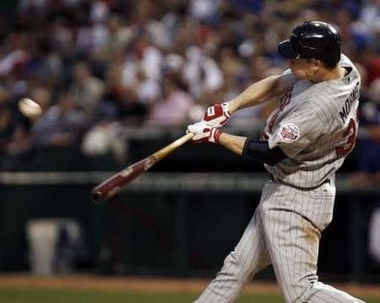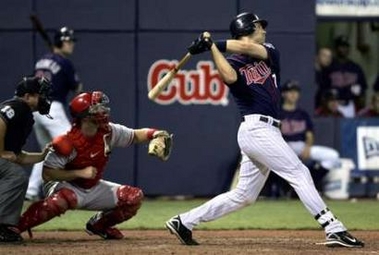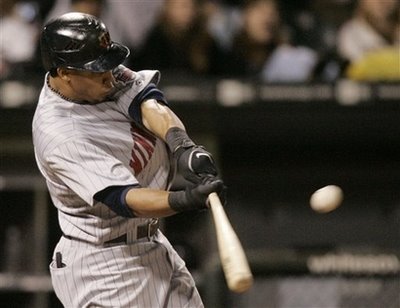July 7, 2008
Offense!
That's a whole bunch of horrible, with a little mediocre mixed in. On average, the Twins have been the 10th-best offense in the league over the past 15 seasons and failed to produce one of the AL's top five offenses even once during that span. That didn't figure to change much this season, as a lineup that ranked 12th in scoring last year lost one of its best hitters in Torii Hunter. Except it's early July and the Twins rank third in scoring and are one big game from passing the Red Sox for second place.
 Glancing at the Twins' team-wide hitting numbers, it's tough to see how they're scoring so many runs. If this were 1988 and we didn't know better, the fact that they rank third in batting average would explain how they rank third in scoring. Instead, this is 2008 and despite what Dick Bremer would have you believe there's a decade-plus worth of studies to show that batting average takes a clear backseat to several other stats when it comes to correlating with runs.
Glancing at the Twins' team-wide hitting numbers, it's tough to see how they're scoring so many runs. If this were 1988 and we didn't know better, the fact that they rank third in batting average would explain how they rank third in scoring. Instead, this is 2008 and despite what Dick Bremer would have you believe there's a decade-plus worth of studies to show that batting average takes a clear backseat to several other stats when it comes to correlating with runs.
In other words, when the Twins rank eighth in on-base percentage and eighth in slugging percentage, scoring the third-most runs in the league seemingly doesn't make much sense. They also rank 11th in walks and dead last in homers, so even with the league's third-best batting average the Twins have been below average at both getting on base and accumulating bases. Based on the lineup's overall numbers, the Twins should rank right in the middle of the AL pack in scoring.
So how do they rank near the top? Believe it or not, there's a relatively simple explanation. While the Twins rank just eighth in on-base percentage and eighth in slugging percentage overall, they lead the league in both on-base percentage and slugging percentage with runners in scoring position. In fact, they lead all of baseball in both categories while also posting the majors' highest batting average with runners in scoring position by an amazing 30 points.
AL TEAMS WITH RUNNERS IN SCORING POSITION
AVG OBP SLG
Minnesota .318 Minnesota .389 Minnesota .469
Baltimore .280 Baltimore .370 Chicago .459
Chicago .280 Oakland .368 Baltimore .435
Kansas City .276 Texas .365 Cleveland .425
Oakland .276 Cleveland .361 Texas .424
AL AVERAGE .269 AL AVERAGE .354 AL AVERAGE .409
No team in baseball has been as good as the Twins with RISP and it's not particularly close. No other team in the league has hit above .280 with RISP and the AL as a whole has batted .269 in those spots, yet the Twins are at .318. Their OBP with RISP is 10 percent better than the AL average and their SLG with RISP is 15 percent better than the AL average. Mediocre overall and amazing with RISP is a decent recipe for a high-scoring offense, and the Twins have been cooking with it all season.
At the most basic level, offense is about getting runners on base and driving them home, which is why a lineup that ranks eighth in both OBP and SLG typically tends to rank somewhere around eighth in runs. However, if that same lineup fares exceptionally well at driving runners in once they reach base, that goes a long way towards making up for having a modest number of runners to begin with. Think of scoring runs like buying lottery tickets.
If each ticket has an equal chance of winning, then the person who buys the most tickets has the best odds of winning. However, if certain people somehow have significantly better odds of winning with each ticket they buy, then they can have the best chance of winning without buying the most tickets. So far the Twins have purchased an average amount of lottery tickets, but their numbers have been called far more often than everyone else and they've been able to cash them in at a very high rate.
 Here's where things get tricky. Twins fans would love to believe that the lineup's excellent performance with RISP is by design. Perhaps it's an organization-wide philosophy that stresses hitting in key spots or perhaps hitting coach Joe Vavra has simply convinced everyone to take a smarter approach at the plate when there are runners to be driven in. Whatever the case, it'd be nice if hitting .318/.389/.469 with RISP was a skill in the sense that it could be repeated over the long haul.
Here's where things get tricky. Twins fans would love to believe that the lineup's excellent performance with RISP is by design. Perhaps it's an organization-wide philosophy that stresses hitting in key spots or perhaps hitting coach Joe Vavra has simply convinced everyone to take a smarter approach at the plate when there are runners to be driven in. Whatever the case, it'd be nice if hitting .318/.389/.469 with RISP was a skill in the sense that it could be repeated over the long haul.
Unfortunately, baseball history and Twins history suggest that's usually not the case. Calling what the Twins have done with RISP thus far "luck" is misleading, because that carries a negative connotation for many people. However, posting mediocre overall numbers while performing exceptionally well with RISP is typically not something that can be sustained over time, whether you want to call that "luck" or something else. Put another way: What they've done with RISP is amazing, but unlikely to continue.
It'd be nice to believe that the Twins' lineup possesses the ability to raise its collective game to a much higher level in key spots and it's certainly possible that they'll continue to do so for the remainder of the season, but betting against it would be the smart play. Among AL teams, the Twins failed to post a top five OPS with RISP in any of the previous eight seasons, often finishing near the bottom of the league in that category.
What they've already done obviously can't be taken away--and it's been a whole lot of fun to watch--but if the Twins continue to rank in the middle of the pack in both OBP and SLG going forward they're highly unlikely to finish with one of the league's top three offenses. Those are the facts and that's simply how baseball tends to work, whether Twins fans want to hear it or not. Of course, none of that means the Twins' offense is going to fall apart.
If they continue to be mediocre in OBP and SLG the offense will likely decline in the second half, but there's nothing that says the lineup has to continue at its current rate. In other words, the Twins can make up for some of the likely drop in RISP magic that lies ahead by simply hitting better overall. Get more runners on base or hit for more power and you no longer have to count on an unsustainably great performance with RISP to score runs. Buy more lottery tickets and you don't have to get as lucky.
 Much like they did in 2006 by replacing Juan Castro and Tony Batista with Jason Bartlett and Nick Punto, the Twins have adjusted their infield on the fly again this year by adding Alexi Casilla and Brian Buscher to the mix. Casilla has added a much-needed on-base threat and surprising pop to the top of the lineup, hitting .320/.364/.450 in 45 games. Buscher has taken advantage of Mike Lamb's horrible play by replacing him as a the regular third baseman while hitting .333/.361/.424 in 19 games.
Much like they did in 2006 by replacing Juan Castro and Tony Batista with Jason Bartlett and Nick Punto, the Twins have adjusted their infield on the fly again this year by adding Alexi Casilla and Brian Buscher to the mix. Casilla has added a much-needed on-base threat and surprising pop to the top of the lineup, hitting .320/.364/.450 in 45 games. Buscher has taken advantage of Mike Lamb's horrible play by replacing him as a the regular third baseman while hitting .333/.361/.424 in 19 games.
Casilla and Buscher aren't likely to continue batting .330 together all year, but have a chance to provide upgrades over what the Twins got for the first two months. Similarly, Delmon Young has gotten on track after a brutal start, hitting .314/.361/.494 over his past 40 games. Jason Kubel has emerged as a third left-handed impact bat alongside Joe Mauer and Justin Morneau in the middle of the lineup, hitting .304/.391/.558 over his past 42 games and .276/.338/.481 in 174 games dating back to last year.
Toss in the usual outstanding production from Mauer and Morneau, and the lineup as a whole is much different and more potent than the group that ranked as the AL's second-worst in April. It's unlikely that the Twins can continue to put up such amazing numbers with runners in scoring position, but it's also unlikely that they'll need to in order to finish the season with one of the best offenses that they've had since 1992. Pitching and defense have been great and all, but hitting is nice too. Who knew.
Once you're done here, check out my latest "Daily Dose" column over at Rotoworld.

